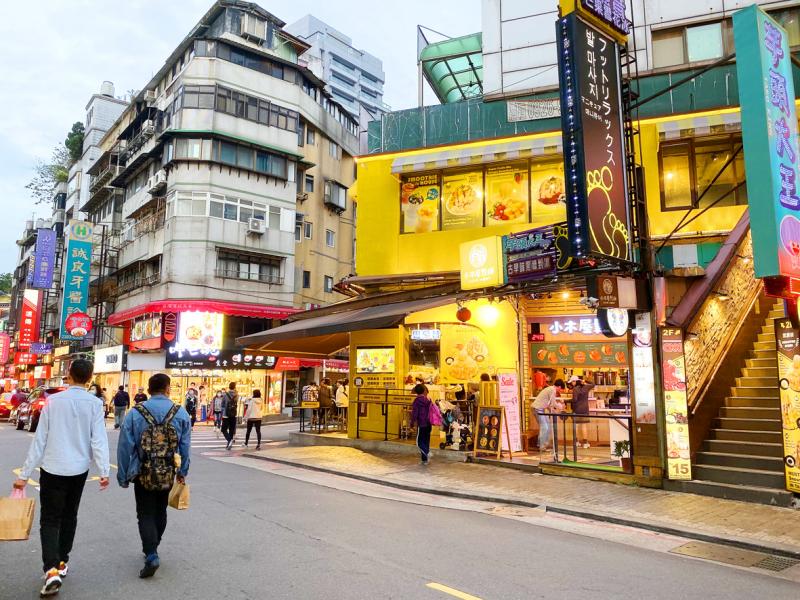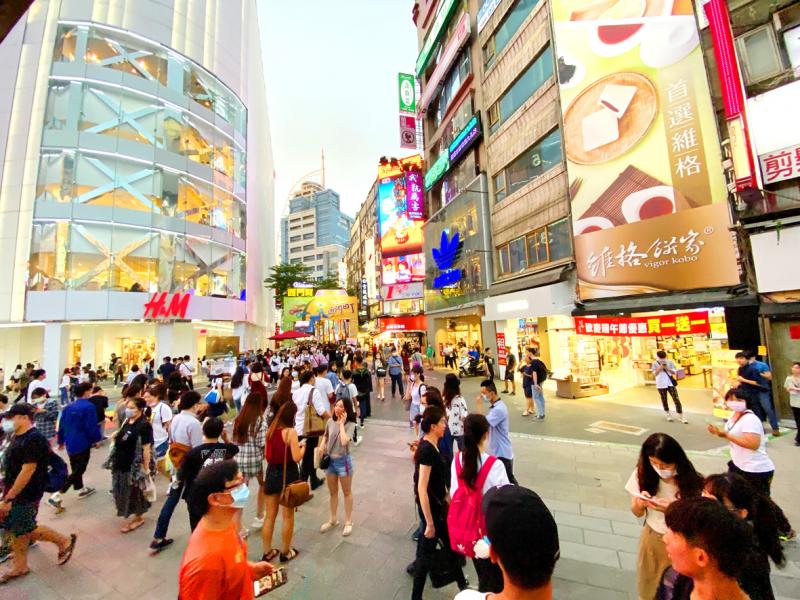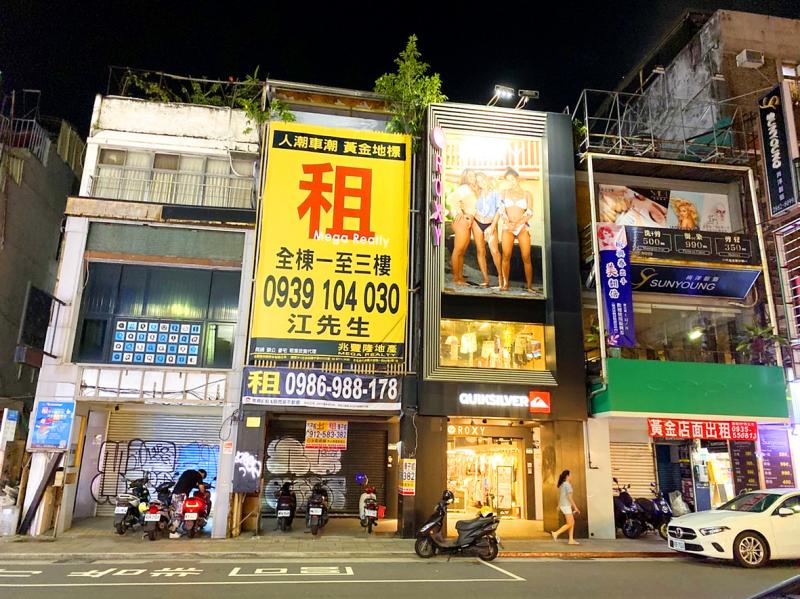Commercial lease rates in three major shopping districts in Taipei are spiraling lower amid a steep decline in foreign visitors caused by the COVID-19 pandemic, local business associations said.
Overseas visitor arrivals were down 86 percent in the first 10 months of the year, and the loss of 8.4 million foreign tourists has dealt a particularly heavy blow to some of the more popular areas tourists visit in Taipei.
Among the hardest hit by the COVID-19 travel restrictions that continue to keep foreign visitors away is the Yongkang Street area, normally a big hit with Japanese, South Koreans and Hong Kongers.

Photo: Yang Hsin-hui, Taipei Times
One indicator of the decline in traffic there is the 17.8 percent year-on-year fall in people entering or exiting the nearby Dongmen MRT station in the first 11 months of the year, representing 1.55 million fewer potential consumers checking out Yongkang Street shops.
Since the beginning of this year, at least 40 businesses in the area have closed, and several others are planning to shut this month, Taipei Dongmen Yongkang Business Circle Development Association president Liu Hung-hsiang (劉鴻翔) said.
Ice Monster (冰館), a shaved ice dessert shop chain, opened its shop on Yongkang Street in 1995, but has announced plans to close the shop by the end of the year, as has nearby rival King Mango (芒果皇帝).

Photo: Cheng Ming-hsiang, Taipei Times
High rents were the final straw for many retailers, resulting in the closure of some well-established businesses, said Chen Chieh-ming (陳傑鳴), director of housing research center Ubee (屋比).
With traffic down and tenants abandoning the area, monthly rents for retail spaces in the district have fallen to about NT$6,000 per ping (3.3m2) from more than NT$10,000 before the pandemic, Chen said.
They could fall even further as more retail spaces in prime locations in the area become available, he said.

Photo: Yang Hsin-hui, Taipei Times
The government should offer tax breaks and preferential water and electricity rates to retailers, and landlords should reduce rents to help business owners survive the hard times brought on by the pandemic, Liu said.
The association has planned a series of shopping events in the Yongkang shopping zone to attract customers and has collaborated with food delivery platforms to help boost business, Liu said.
The two other areas where rental rates are tumbling amid the decline in visitor numbers are Ximending (西門町) and the Shilin Night Market (士林夜市).
Liu Chia-hsin (劉家鑫), chairman of the Taipei City Ximending Pedestrian Zone Development Promotion Association, said that businesses in Xinmending were hurt by the pandemic, but have gradually recovered since July, with food and beverage outlets seeing sales return to 80 to 90 percent of pre-pandemic levels.
However, rents for retail space remain depressed, having fallen by 30 to 50 percent to NT$10,000 to NT$12,000 per ping per month.
Business in the Shilin Night Market has been hurt, because about 70 percent of its pre-pandemic traffic came from overseas tourists.
However, the area has also been hurt by its reputation for overpriced goods after local media last year reported that one vendor had charged a foreign tourist more than NT$1,000 for a bag of cut fruit, Shilin Night Market Development and Promotion Association director Su Wen-shan (蘇文山) said.
That has made it hard to lure domestic consumers to make up for the fall in overseas tourists, Su said.
As a result, monthly store rents in area have fallen on average by about 20 to 30 percent, with the rent for a shop on Wenlin Road down to about NT$3,500 per ping, he said.
Su said that the crisis could offer the night market an opportunity to reposition itself to domestic consumers.
The association would work with high schools and colleges in the neighborhood on polls to identify the best vendors and publicize the lists to help give local consumers confidence about visiting the night market, he said.

Taiwan’s rapidly aging population is fueling a sharp increase in homes occupied solely by elderly people, a trend that is reshaping the nation’s housing market and social fabric, real-estate brokers said yesterday. About 850,000 residences were occupied by elderly people in the first quarter, including 655,000 that housed only one resident, the Ministry of the Interior said. The figures have nearly doubled from a decade earlier, Great Home Realty Co (大家房屋) said, as people aged 65 and older now make up 20.8 percent of the population. “The so-called silver tsunami represents more than just a demographic shift — it could fundamentally redefine the

Businesses across the global semiconductor supply chain are bracing themselves for disruptions from an escalating trade war, after China imposed curbs on rare earth mineral exports and the US responded with additional tariffs and restrictions on software sales to the Asian nation. China’s restrictions, the most targeted move yet to limit supplies of rare earth materials, represent the first major attempt by Beijing to exercise long-arm jurisdiction over foreign companies to target the semiconductor industry, threatening to stall the chips powering the artificial intelligence (AI) boom. They prompted US President Donald Trump on Friday to announce that he would impose an additional

China Airlines Ltd (CAL, 中華航空) said it expects peak season effects in the fourth quarter to continue to boost demand for passenger flights and cargo services, after reporting its second-highest-ever September sales on Monday. The carrier said it posted NT$15.88 billion (US$517 million) in consolidated sales last month, trailing only September last year’s NT$16.01 billion. Last month, CAL generated NT$8.77 billion from its passenger flights and NT$5.37 billion from cargo services, it said. In the first nine months of this year, the carrier posted NT$154.93 billion in cumulative sales, up 2.62 percent from a year earlier, marking the second-highest level for the January-September

Asian e-commerce giant Shein’s (希音) decision to set up shop in a historic Parisian department store has ruffled feathers in the fashion capital. Anger has been boiling since Shein announced last week that it would open its first permanent physical store next month at BHV Marais, an iconic building that has stood across from Paris City Hall since 1856. The move prompted some French brands to announce they would leave BHV Marais, but the department store had already been losing tenants over late payments. Aime cosmetics line cofounder Mathilde Lacombe, whose brand was among those that decided to leave following